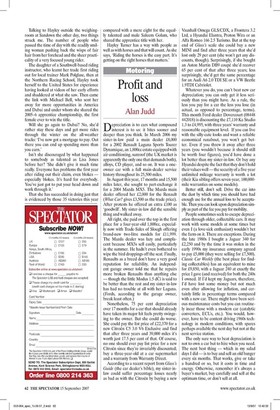Profit and loss
Alan Judd Depreciation is to cars what compound interest is to us: it bites sooner and deeper than you think. In March 2006 my sister-in-law paid a main dealer £8,000 for a 2002 Renault Laguna Sports Tourer Dynamique, an 1,800cc estate equipped with air-conditioning, sunroof (the UK market is apparently the only one that demands both), alloys, CD player, and so on. It was a oneowner car with a full main-dealer service history throughout its 25,500 miles.
In August this year, 17 months and 15,500 miles later, she sought to part-exchange it for a 2004 Mazda MX5. The Mazda main dealer offered her £2,000 for the Renault (What Car? gives £3,500 as the trade price). After protests he offered an extra £100 as 'goodwill'. My sister-in-law did the sensible thing and walked away.
All right, she paid over the top in the first place for a four-year-old 1,800cc, especially now with Trade-Sales of Slough offering brand-new two-litre models for £11,999. The Mazda dealer was lazy and complacent because MX5s sell easily, particularly in the summer. He hadn't even bothered to wipe the bird droppings off the seat. Finally, Renaults as a breed don't have a very good reputation for reliability. An independent garage owner told me that he repairs more broken Renaults than anything else — though the little Modus 1.5 dCi is said to be better than the rest and my sister-in-law has had no trouble at all with her Laguna. (Fords, according to the garage owner, break least often.) Nonetheless, 75 per cent depreciation over 17 months for a car that should already have taken its major hit feels pretty swingeing to the owner. But she could do worse. She could pay the list price of £22,370 for a new Citroen C5 3.0 V6 Exclusive and find that after three years and 39,000 miles it's worth just 17.5 per cent of that. Of course, no one should ever pay list price for a new Citroen since they're invariably discounted; buy a three-year-old at a car supermarket and a warranty from Warranty Direct.
According to a recent report from Glass's Guide (the car dealer's bible), my sister-inlaw could suffer percentage losses nearly as bad as with the Citroen by buying a new Vauxhall Omega GLS/CDX, a Frontera 3.2 Ltd, a Hyundai Elantra, Proton Wira or an Alfa Romeo 166 2.5 Turismo. But at the top end of Glass's scale she could buy a new MINI and find after three years that she'd lost only 29 per cent (she won't get any discounts, though). Surprisingly, if she bought an Aston Martin DB9 coupe she'd recover 65 per cent of that after three years; less surprisingly, she'd get the same percentage for an Audi A6 2.0 TDI SE or a VW Beetle 1.9TDI Cabriolet.
Whatever you do, you can't beat new car depreciation; you can only get it less seriously than you might have. As a rule, the less you pay for a car the less you lose (in actual, as opposed to percentage, terms). This month Ford dealer Dovercourt (08448 442018) is discounting the £7,110 Ka Studio 1.3 to £4,995, with three years' warranty and reasonable equipment level. If you can live with the silly-cute looks and want a reliable economical runabout, you won't get better. Even if you threw it away after three years (you wouldn't because it should still be worth four figures), you'd have done a lot better than my sister-in-law. Or buy any Hyundai despite the fact that they don't hold their values well — the security of a five-year unlimited mileage warranty is worth a lot (their Kia sibling offers seven-year, 100,000mile warranties on some models).
Better still, don't sell. Drive the car into the dust by which time you should have had enough use for the annual loss to be acceptable. Then you can look upon depreciation simply as part of the fee you pay for mobility.
People sometimes seek to escape depreciation through older, collectable cars. It may work with some models at some times but even I (a love-sick enthusiast) wouldn't bet the farm on it. There are exceptions. During the late 1980s I bought a Jaguar 340 for £2,250 and by the time it was stolen in the early 1990s my insurance company agreed to pay £5,000 (they were selling for £7,500). Classic Car Weekly (the best place for finding collectables) has an equivalent to mine for £9,850, with a Jaguar 240 at exactly the price I gave (and received) for both the 240s I owned. If I'd kept my Jaguars, therefore, I'd have lost some money but not much even after allowing for inflation, and certainly little in percentage terms compared with a new car. There might have been serious maintenance costs but you can routinely incur those with a modern car (catalytic converters, ECUs, etc.). You would, however, have to be content driving 1960s technology in modern conditions, with spares perhaps available the next day but not at the next service station.
The only sure way to beat depreciation is not to own a car but to hire when you need. The next best thing — which in my salad days I did — is to buy and sell an old banger every six months. That works, give or take a hundred or so, but it costs in time and energy. Otherwise, remember it's always a buyer's market, buy carefully and sell at the optimum time, or don't sell at all.

























































 Previous page
Previous page